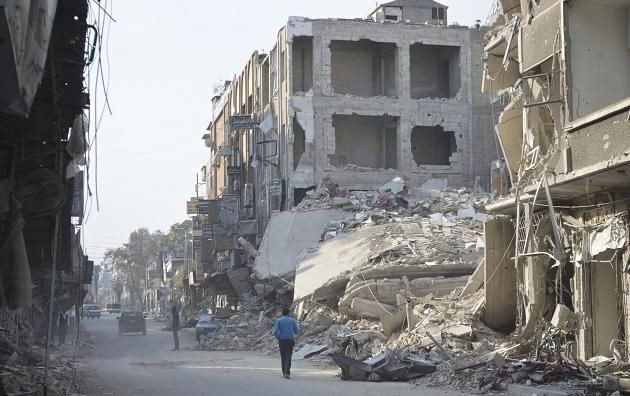US Hints At Possible Syria Intervention, Israel Discusses Chemical Weapons With Jordan

Syria's stockpiles of sarin gas and chemical weapons have been eyed with trepidation for the last month by world leaders declaring that their use against Syrian civilians would be unacceptable and cross several red lines, possibly provoking a military intervention.
Thus far there have been no reports that Syrian President Bashar al-Assad has actually fired the sarin gas on his own people, although there have been confirmed Scud missile attacks on civilians. But the world is still wary.
The West's issue with the Syrian's chemical weapons is two-fold: First, there is a fear that the "desperate Assad" described by U.S. Secretary of State Hillary Clinton might use these weapons, which the U.N. classifies as weapons of mass destruction, against its own people. Second, there is the fear that once Assad is gone, the weapons will fall into the hands of Hezbollah or a similar group with a less-than-stellar reputation for peacekeeping and cooperation with the West.
Jeffrey White, a Defense Fellow at the Washington Institute, said earlier in December that he didn't think Hezbollah would want to risk holding onto such weapons, for fear of angering Israel. "I don't think transferring them to Hezbollah would be likely," White said. "They might not want them."
But Israel isn't taking any chances, it seems.
In early December the Atlantic reported that Israeli Prime Minister Benjamin Netanyahu was seeking Jordanian approval to bomb known sites of Syrian chemical weapon stockpiles. They were told "the time is not right."
But the time might be drawing nearer, as Assad's time runs out and the risk of the wrong hands grasping the chemical weapons become greater. Israeli media reports confirmed that Netanyahu met again with Jordan's King Abdullah on Wednesday in Amman, but the outcome of the meeting was unclear.
Already, one stash of Hezbollah chemical weapons found in southern Lebanon last August spontaneously and mysteriously exploded, the Kuwaiti paper Al-Siyasa reported at the time. A deputy Hezbollah leader denied that the weapons were chemical, insisting they were shells collected "during and after Israel's withdrawal from Lebanon in 2000."
Israel's deputy Prime Minister Moshe Ya'alon told Israeli Army Radio that both Israel and the U.S. were very concerned with where the chemical weapons could end up, and he hinted that the U.S. might be preparing for a military intervention should the chemical weapons fall into hands of which the U.S. does not approve. This, Ya'alon said, would be another "red line" for the U.S..
"The U.S. is certainly spearheading the battle here, both diplomatically and in preparation for the possibility of intervention," Ya'alon said, as translated by the Jewish News Service. "I don’t know about deploying forces, but certainly there are different options to prevent this. Therefore, all the interested parties, including Israel, are closely monitoring the situation."
Noel Clarke, a spokesman for the U.S. State Department, would not discuss intelligence or the specifics of U.S. contingency plans, except to say that the U.S. "has always said that contingency planning is the responsible thing to do, and we are actively consulting with friends, allies, and the opposition.
"We continue to closely monitor Syria’s proliferation-sensitive materials and facilities," Clarke told IBTimes in an email. "The international community is united on this issue, and the message to the Assad regime about our redlines has been very clear. We remain focused on supporting the opposition and working with like-minded countries on what more we can do to support a political transition that brings the conflict in Syria to an end."
© Copyright IBTimes 2024. All rights reserved.






















